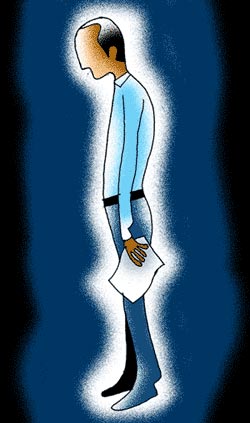CareerBuilder.in
The last thing you want to do is tick off your prospective employer and ruin your chances of landing a dream job. Presenting a list of things you must absolutely stay away from...
Interviewers or head-hunters are the gateway to the company that one yearn to be a part of.
If any single activity of yours frustrates them, then getting through the job interview can be a daunting task.
Here are some situations or actions that you need to be watchful of when you're meeting a prospective recruiter.
1. Unpreparedness
Candidates who come for interviews without preparation irritates the interviewers the most.
Before you head for an interview, read about the company's history and its most recent activities -- mergers, acquisitions, if any; refer to its balance sheet to get a better idea.

Please click NEXT to continue reading...
Illustration: Uttam Ghosh/Rediff.com
2. Short replies
Image: Not giving away too much information is a sign of disinterest.In their effort to play safe, a lot of candidates try and give short answers.
Beyond a point, this frustrates the interviewer.
Short, one-word responses are signs of disinterest.
It is the job of the interviewer to gauge your personality from the way you respond to difficult questions and situations.
When s/he doesn't get enough substance from you, you might annoy her/him.
It is important to be brief, but whenever demanded, do elaborate your views.
Please click NEXT to continue reading...
Illustration: Dominic Xavier/Rediff.com
3. Cluelessness
Image: The interviewer will not entertain a candidate who doesn't have a clear idea of what s/he wants to do with his/her life and career.Candidates who have no clear reason or intent as to why they applied for the position annoy recruiters.
It's important to have a plan -- what you want to achieve in your life or what good you can bring to the organisation you intend to work for.
Your lack of interest or enthusiasm can affect your career greatly.
Please click NEXT to continue reading...
Illustration: Uttam Ghosh/Rediff.com
4. Undervalued candidates
Image: Irrespective of the competition, it is important that you value your skills and highlight them before the recruiter.From the time you enter the interview room till the time you're there, it is important that you market yourself well.
No matter how little experience or skills you have, it is important to highlight them to the recruiter.
If you leave it to the interviewer to figure out whether you're worthy to be hired or not, chances are you've already ruined the opportunity.
Please click NEXT to continue reading..
Illustration: Dominic Xavier/Rediff.com
5. Bad attitude
Image: Be sure to keep your attitude in check while speaking to the recruiter.No matter how awesome or suitable you are for the particular job, if recruiter doesn't like your attitude, s/he won't hire you.
Try not to be showy, overpowering, or annoying.
Be gentle and patient.
Display ambition and energy in the right measure.
Please click NEXT to continue reading...
Illustration: Uttam Ghosh/Rediff.com
6. Cheating, Lying
Image: Try not to replicate answers from off the internet.While it is important to prepare your answers to tricky questions well in advance, chanting the traditional responses off the internet may go against you during interviews.
Recruiters want to know how innovative and instant you are with your thoughts, rather how well you imitate.
Be yourself and try to express your views in your own words.
Please click NEXT to continue reading..
Illustration: Uttam Ghosh/Rediff.com
7. Not being honest
Image: It's okay to talk about your weaknesses so long as you intend to improve.What are your strengths and weaknesses? -- is one question most recruiters pose during the personal interview rounds.
The aim of the question is to find out how honest you're about your limitations and whether or not you plan to improve them.
Some candidates try to play Smart Aleck by saying things like 'I'm very particular about deadlines, and that is my weakness' or perhaps some other interesting response from the Internet.
It wouldn't take long for the interviewer to realise that your weakness is poor communication skills.
It's okay to share your weaknesses with your employer as long as say you intend to work upon them and you'll not let it come in the way of your performance.
Please click NEXT to continue reading...
Illustration: Uttam Ghosh/Rediff.com
8. Rudeness
Image: How you respond to the recruiter's call pretty much sets the tone for the rest of the conversation.When you get a call from a recruiter, how do you respond to them?
If they call you when you're in a meeting or when you're travelling, it might irritate you.
However, you must be polite and be sure to reschedule the conversation whenever you have the time.
If you're unable to attend the call, drop in a text saying you'd return the call when you're available.
Even if the recruiter tries to be pushy by asking you difficult questions over the phone, it is important that you deal with them politely.
Being rude or venting your frustration will only annoy them and ruin your chances of landing that dream interview.
Illustration: Uttam Ghosh/Rediff.com









Comment
article